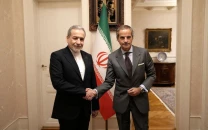Netanyahu, Gantz supporters in waiting game as poll results trickle in
Fears of election fatigue did not materialise, with turnout at 69.4 per cent, higher than in April polls

PHOTO: AFP
At Gantz's event in the Israeli commercial capital Tel Aviv beginning Tuesday night after voting ended, the mood was initially one of quiet excitement.
Several hundred young activists, some wearing t-shirts bearing the slogan of Gantz's centrist Blue and White coalition, waited impatiently for their leaders to emerge.
Exit poll results flashed over large screens and created a stir of excitement as they showed the ex-military chief still had a chance to become the country's next prime minister and end Netanyahu's long tenure in office -- a total of more than 13 years.
"We don't want to say that it is won, but we very much hope so," an emotional 22-year-old volunteer Rotem Mizrahi said.
Israel votes on Netanyahu's political survival
But as the official vote count ground slowly on, Gantz called for patience.
"Naturally we will wait for the final results. But as it appears, we were up to the task and no less important, we did it our way," Gantz told the crowd, adding he would seek to form a broad unity government.
After the speeches the Israeli national anthem rang out through the hall.
A couple of miles away at Netanyahu's election party, rank and file members of his Likud were not admitted to the building until after 11:00 pm, an hour after the first exit polls.
Those results -- which fell short of Netanyahu's hopes -- were not shown on the screens.
In the end doors were opened and a couple of hundred supporters entered.
They chanted "Bibi King of Israel," using a common nickname for the Israeli leader.
Others sat down exhausted and checked their phones, election signs reading "Netanyahu strong right" discarded in empty chairs as dance music played.
Netanyahu finally emerged around 3:00 am (0000 GMT), a full five hours after the exit polls.
Excitement suddenly bristled through the crowd, with people standing on seats to see the man many view as a hero.
Netanyahu started by hugging his ministers while the crowd chanted slogans against him joining a national unity government, preferring a right-wing formation similar to the current coalition.
He was introduced as the "prime minister and the next prime minister."
The 69-year-old, whose voice was hoarse, showed no sign he was ready to give up his tenure as Israel's longest-serving prime minister anytime soon.
"At this time, for the sake of all these goals, Israel needs a strong government, a stable government, a Zionist government. A government that is committed to Israel as the nation-state of the Jewish people," he said.
Three separate exit polls showed Netanyahu's right-wing Likud and Gantz's centrist Blue and White alliance with between 30 and 32 parliament seats each out of 120.
Fears of election fatigue did not materialise, with turnout at 69.4 per cent, higher than in April polls.
Ex-defence minister Avigdor Lieberman's nationalist Yisrael Beitenu party, which could play a kingmaker role, could win between eight and nine seats, according to the polls.
If the polls are reasonably accurate -- and they have in the past been off base -- either Netanyahu or Gantz will face tough negotiations to form a government.
How elections in Israel work
After the exit polls were released, Lieberman called for a unity government with his party, Likud and Blue and White as he addressed supporters, saying the country was facing an "emergency".
"There is only one option for us," he said, adding the unity government should exclude the country's ultra-Orthodox religious parties, which he accuses of having undue influence on politics.
The stakes could not be much higher for the 69-year-old Netanyahu, Israel's longest-serving prime minister but who is facing possible corruption charges in the weeks ahead.



















COMMENTS
Comments are moderated and generally will be posted if they are on-topic and not abusive.
For more information, please see our Comments FAQ